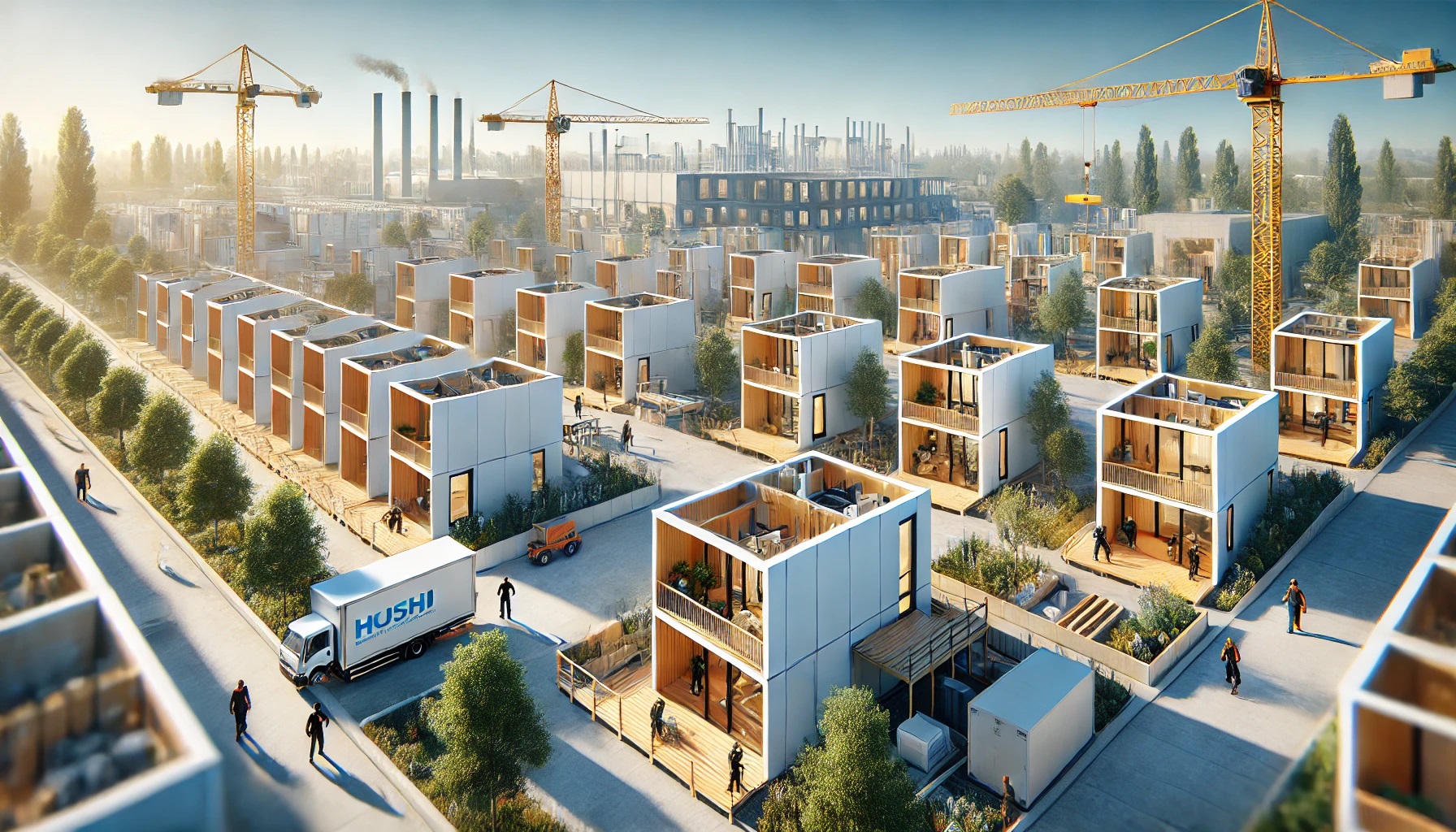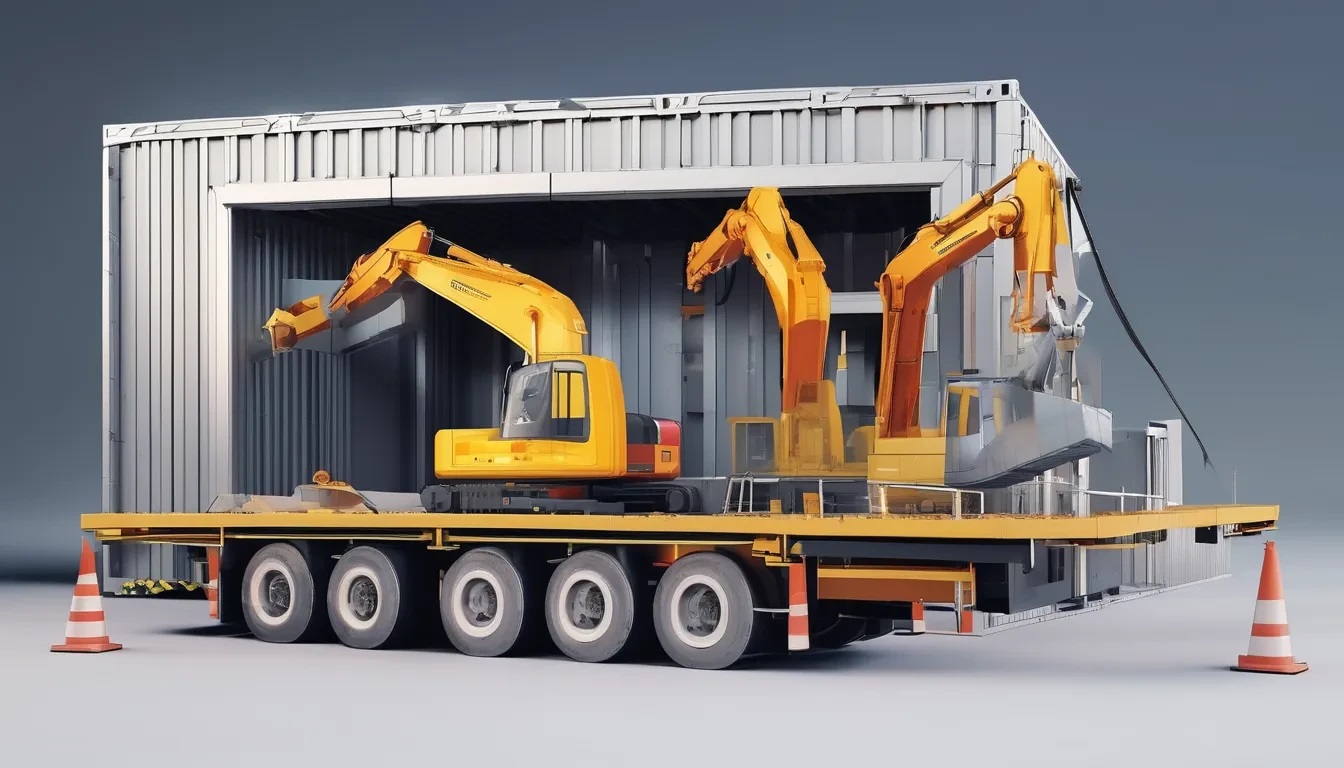
What is Modular Construction? Types, Examples, Advantages & Companies
What is Modular Construction?
Modular construction is an innovative building process where structures are constructed off-site in controlled factory environments and then transported to the project site for assembly. The buildings are created in modules or sections, which are joined together to form a complete structure. These modules, built to the same standards as traditional structures, are integrated seamlessly, offering similar quality and durability as on-site construction.
Modular Buildings and Modular Structures
Modular buildings are complete structures created from prefabricated building modules designed to be both flexible and scalable. They can serve various purposes, including residential homes, schools, offices, and healthcare facilities. Modular structures are versatile, efficiently meeting the needs of different industries with reduced construction time.
Modular Construction Types
- Permanent Modular Construction (PMC): Structures designed for long-term use, offering the same longevity and quality as traditionally built structures.
- Relocatable Modular Buildings (RMB): Temporary or portable buildings that can be moved based on need.
Examples of Modular Construction
Modular construction is increasingly used for pre-built homes, office buildings, healthcare facilities, and even multi-story apartments. Pre-built housing can range from affordable housing to luxury developments. Modular home building companies specialize in creating homes manufactured in factories and assembled on-site, saving time and cost. The global modular construction market size is projected to grow up to USD 140.8 billion by 2029, at a CAGR of 6.2%.
Download our PDF brochure to explore comprehensive insights into our modular construction solutions.
Advantages of Modular Construction
- Time Efficiency: Reduces project timelines as modules are constructed simultaneously with site preparation.
- Cost-Effective: Pre-built modules lead to less waste, lower labor costs, and fewer delays.
- Sustainability: Construction in controlled environments minimizes waste, making it eco-friendly.
- Customizability: Offers a wide range of design possibilities to meet different needs despite using prefabricated methods.
Modular construction is rapidly transforming the building industry by offering numerous advantages over traditional methods. One key benefit is reduced construction time, with modules built off-site in a controlled environment. Unlike traditional stick-built homes, where each part is constructed on-site, modular buildings allow simultaneous processes, reducing project timelines by up to 50%.
In terms of cost efficiency, modular construction offers notable savings compared to stick-built housing due to reduced on-site labor, bulk material purchasing, and fewer delays caused by weather or other disruptions. Prefabricated construction, including prefabricated building construction, involves manufacturing in a factory, allowing for better resource management, less waste, and lower costs.
A major advantage is superior quality control. Since modules are built in factory-like conditions, the precision and uniformity are higher than in traditional construction. For instance, prefab concrete buildings are fabricated under stringent controls, ensuring fewer defects and a consistent product, enhancing durability and safety.
Additionally, modular construction provides design flexibility. The modules can be easily reconfigured or expanded, offering adaptable spaces that evolve with occupants' needs—flexibility harder to achieve with traditional stick-built homes.
Environmental benefits also play a significant role in the appeal of modular construction. The prefabricated process reduces site disturbance, minimizes waste, and often utilizes energy-efficient designs and materials, contributing to sustainability.
Difference Between Prefabricated Construction and Modular Construction
Prefabricated Construction refers to a broader category of building methods where components are manufactured off-site and transported for assembly. These components can include walls, roofs, and floors, produced in a factory to ensure quality and consistency. Advantages include reduced construction time, waste, and increased quality control.
Modular Construction is a specific type of prefabricated construction involving entire sections or modules built off-site and assembled on-site. These modules include internal fixtures and finishes, characterized by assembly speed and design flexibility, allowing for quicker occupancy compared to traditional methods.
Modular Building Companies
Modular building companies specialize in the design, manufacturing, and assembly of modular structures, providing innovative solutions for various applications. They utilize advanced manufacturing techniques to create high-quality, customizable buildings offering numerous advantages.
Key Features
- Design Flexibility: Customized modular designs tailored to project needs.
- Speed of Construction: Off-site manufacturing reduces overall construction time.
- Sustainability: Many prioritize eco-friendly materials and energy-efficient designs.
- Cost-Effectiveness: Streamlined processes result in lower labor and site costs.
- Quality Control: Factory production ensures high standards and durable structures.
- Versatile Applications: Serve diverse sectors, from temporary structures to permanent buildings.
Modular Building Notable Companies
- Modular Space: Customizable, eco-friendly modular buildings for schools and offices.
- Katerra: Integrates design and construction to streamline the modular process.
- Plant Prefab: Focuses on sustainable modular homes with energy-efficient designs.
- Guerdon Enterprises: Specializes in large-scale modular projects, including multi-family housing.
- Blokable: Aims to provide affordable, efficient modular housing solutions.
Modular Construction Companies
Modular construction companies specialize in designing, manufacturing, and assembling prefabricated components. These firms create modular structures efficiently and sustainably for various industries.
By leveraging advanced technologies and streamlined processes, modular construction companies significantly reduce project timelines and costs while maintaining high quality and safety standards. Their expertise encompasses everything from design and engineering to on-site assembly, ensuring a seamless construction experience.
As demand for sustainable building practices grows, modular construction companies deliver eco-friendly solutions that minimize waste and maximize efficiency, playing key roles in the evolving construction landscape.
Modular Construction Top Trending Companies
- Laing O’Rourke (UK): Specializes in innovative modular solutions across various sectors, enhancing efficiency and sustainability.
- Red Sea Housing (Saudi Arabia): Focuses on modular housing solutions in the oil and gas sector, providing prefabricated structures for rapid deployment.
- Atco Ltd. (Canada): Delivers modular buildings and services, emphasizing quality and sustainability.
- Skanska AB (Sweden): Employs modular techniques to enhance project delivery and sustainability in commercial and residential sectors.
- Modulaire Group (UK): Provides flexible modular buildings and accommodation solutions for various sectors.
- Bechtel Corporation (US): Utilizes modular techniques to streamline processes and improve delivery timelines across multiple sectors.
- Fluor Corporation (US): Incorporates modular construction to optimize project efficiency and safety across diverse projects.
- Lendlease Corporation (Australia): Integrates modular construction into projects, focusing on efficiency and sustainability.
- Kleusberg GmbH (Germany): Specializes in modular construction, emphasizing precision engineering and sustainability.
Discover in-depth insights and analysis on the Modular Construction industry, including trends, type, modules and key players. Download a sample report now to stay informed.
Some Examples of Modular Construction
- The Smile Modular Housing Project (UK): Addresses London's housing shortage with prefabricated units assembled on-site.
- The Kasita Micro-Home (US): Compact, fully-equipped modular home designed for affordable housing solutions.
- The Modular School Building (Canada): A rapidly deployed school constructed using modular technology.
- The M2 Modular Building (Australia): A commercial office space showcasing the versatility of modular construction.
- The Red Sea Housing Community (Saudi Arabia): Modular housing project providing accommodations for oil and gas workers.
- The LEED-Certified Modular Office (US): Achieved LEED certification for its sustainable design and construction practices.
- The Prefabricated Emergency Hospital (China): Rapidly built modular hospital in response to COVID-19.
- The Modular Hotel Project (Sweden): Constructed using modular units, showcasing modular construction's application in hospitality.
Modular construction is revolutionizing the building industry by offering a fast, cost-effective, and sustainable alternative to traditional construction methods. With its focus on prefabrication and efficient assembly, this innovative approach significantly reduces construction time and waste while maintaining high-quality standards. The versatility of modular buildings allows for diverse applications, from residential homes to commercial spaces, making it an attractive solution for various sectors. As demand for sustainable practices continues to rise, modular construction is poised to play a crucial role in shaping the future of the built environment.
80% of the Forbes Global 2000 B2B companies rely on MarketsandMarkets to identify growth opportunities in emerging technologies and use cases that will have a positive revenue impact.
- Food Packaging Market Size Set for Strong Growth Through 2030 Amid Rising Demand for Convenience Foods
- Fertilizers Industry Set to Grow at 4.1% CAGR Through 2030
- Leading Automated Guided Vehicle Companies 2024: An In-depth Analysis
- CHARGED UP: SHIFT TO E-MOBILITY AND THE EVOLUTION OF TRANSPORTATION
- Global Automotive Market: Predictions For 2024




